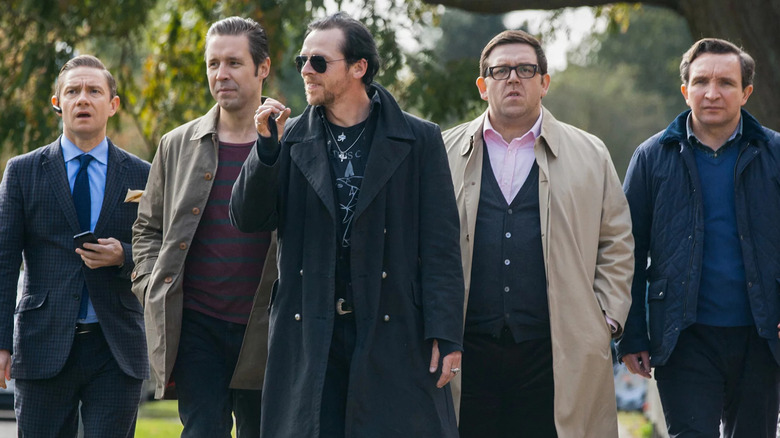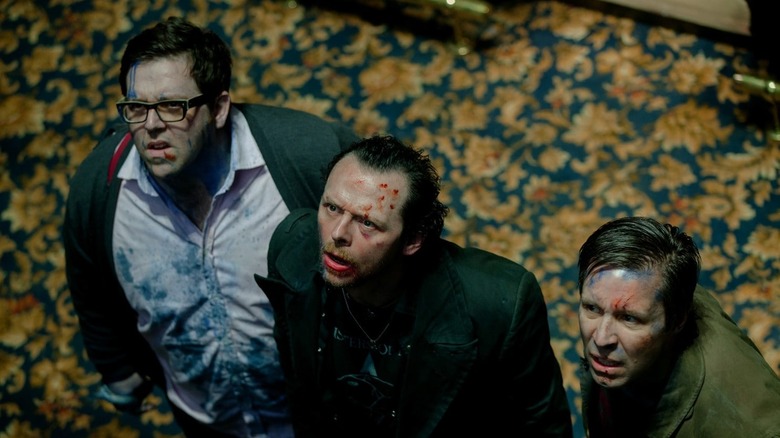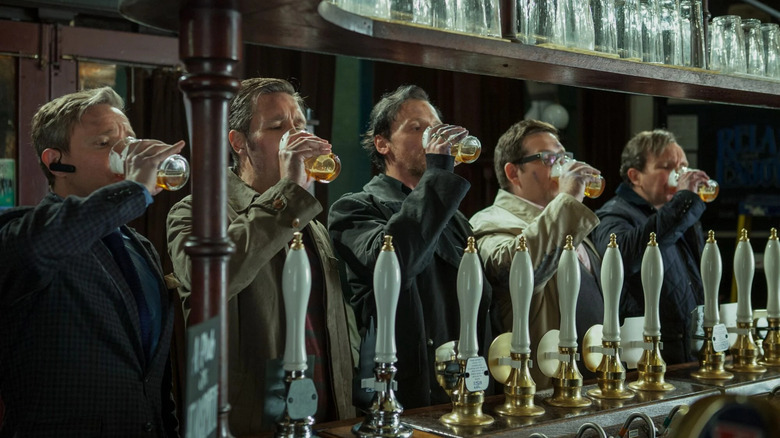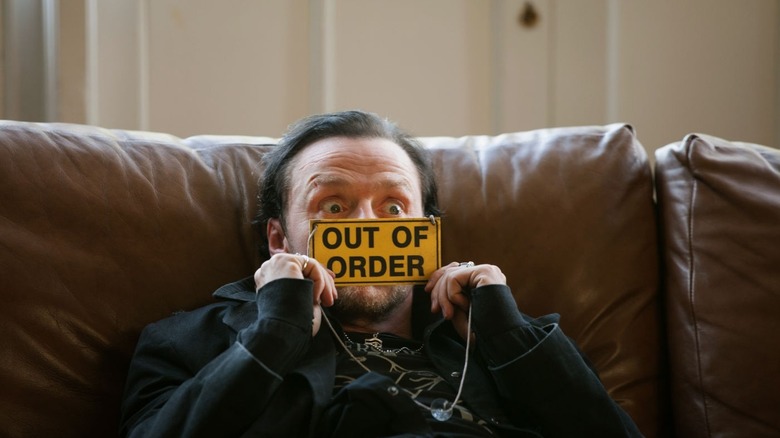How Nostalgia Inspired Edgar Wright To Write The World's End
When I was unemployed and living with my flatmate, my days looked like this: get up around nine, shamble round to the corner shop for cigarettes, beer, and snacks, then sit around playing video games until it was time for the pub. A few years later when "Shaun of the Dead" came out, I'd moved in with my girlfriend and had a job now, working in a PC superstore with my name on my shirt. Edgar Wright's rom-zom-com was a revelation; the characters lived, talked, and behaved just like me and my friends, and it felt exactly how we would react to a zombie apocalypse.
By the time "The World's End" arrived in 2013, I'd lived in the Czech Republic for four years. My visits home to England were always strange affairs, a combination of nostalgia and reverse culture shock. I'd usually hit some of the old pubs with friends, trying to capture a feeling of the old days. It never worked, of course, because we were different people now. Everything was so familiar, but also somehow ... alien.
I know a lot of people prefer "Hot Fuzz," but I'll always champion the uneven third installment of Wright's "Cornetto Trilogy" because of that personal connection, and simply because it has more heart. "The World's End" is a movie that sets off a nostalgia-bomb for anyone who lived in a small town in the U.K. during the '90s, and also has some interesting things to say about the homogenizing powers of globalization and the dangers of trying to relive the past. But how much of Wright's own nostalgia went into the film?
So what happens in The World's End again?
"The World's End" starts with a montage set to some brilliant old skool dance music as Gary King (Simon Pegg) tells his AA group about the best night of his life. On their last day of school, he and his four best mates attempted The Golden Mile, an epic pub crawl around their hometown Newton Haven. They only managed a pint in nine of the 12 establishments along the route before bailing out. Now, over 20 years later, Gary wants to make amends.
The trouble is, all his old pals have grown up, moved away, and got on with their adult lives. Andy (Nick Frost), Gary's old best friend, is now a teetotal lawyer; Steven (Paddy Considine) an architect displaying symptoms of a midlife crisis; Oliver (Martin Freeman) a yuppy-ish estate agent; and Peter (Eddie Marsan) a car salesman. None of them are particularly thrilled with the prospect of going back to another stab at the Golden Mile, but Gary's irritating insistence pushes them into it.
Grudgingly arriving in Newton Haven, they find that Gary hasn't moved on at all since the '90s, driving the same old banger and listening to the same mixtape. Once they start drinking, he is in his element, but there is something strange about the town. The locals all seem strangely emotionless and every pub now looks the same. A few pints in, it becomes clear that the townsfolk have been replaced by sinister blue-blooded "blanks." To avoid suspicion, Gary argues that the best course of action is to keep drinking and complete the Golden Mile...
How The World's End came about
We Brits are very sentimental about our pubs, and the good old-fashioned boozer is gradually disappearing into folklore. Every time I go back to my hometown, another few have gone to the wall. One of my old locals is now a branch of Tesco Express while another, once featured on the Sky One show "Britain's Toughest Pubs," is now a bridal wear shop.
That nostalgia is often misplaced, because some of those dives were grim, depressing, and downright dangerous. But I'd still take a sticky-carpeted spit-and-sawdust pub full of local characters over an antiseptic, Ikea-fied chain gastropub any day.
"The World's End" comments on this phenomenon of "Starbucking" quite brilliantly; notice how the interiors of the first two pubs are identical. We're used to "Body Snatchers" style alien invasion plots where people are turned into soulless duplicates, but it doesn't usually extend to the decor in their watering holes. Wright said (via Indiewire):
When I returned to my hometown to shoot "Hot Fuzz," I was bemused to find a sparkling new Starbucks in the center of the high street. I ended up digitally erasing it from the movie. I'd built up this romanticized image of my birthplace and yet it was no different from London, the same chains, the identical pubs. So the movie is about the realization that you cannot stop progress and in fact the "villains" of the piece see themselves as benevolent and efficient, wanted to improve the planet and lose the rough edges.
How nostalgia inspired Edgar Wright
"The World's End" is loaded with nostalgia, especially the superb soundtrack stacked with needle drops from a specific era in the '90s between Madchester and Britpop. The nostalgia isn't just there for nostalgia's sake, however; it is crucial to understanding who Gary is as a character.
Edgar Wright spoke at length on the subject during the publicity of "The World's End." He said (via Indiewire):
I have a tendency to think back to my school years quite a lot and I wonder why, and it kind of amuses me as much as it obsesses me. I'm pretty happy with my life and career and I'm always bothered by the fact that I wanted to go back and do school better and go on dates. So I think there's a part of Gary King and the recreation of the special night that I can definitely sympathize with.
Gary is obnoxious, overbearing, and completely irresponsible, but Simon Pegg finds real pathos in the character. It's not that Gary thinks that completing the Golden Mile will help him move on with his life; he just wants to stay in that moment forever. It's very sad, especially if you know anyone who is stuck in the past like that, desperately wishing they could recapture the feeling they had when they were young and carefree. I guess we all have our moments of wondering what might have been, but Gary's refusal to let the past go is what gives the nostalgia in "The World's End" that extra poignancy.



